Unequal Access to Legal Service in Canada
VerifiedAdded on 2023/06/15
|8
|1689
|107
AI Summary
This article discusses the issue of unequal access to legal services in Canada, particularly for the rural, poor, and aboriginal groups. It highlights the challenges faced by the Canadian justice system and the need for improvement in accessibility to justice.
Contribute Materials
Your contribution can guide someone’s learning journey. Share your
documents today.
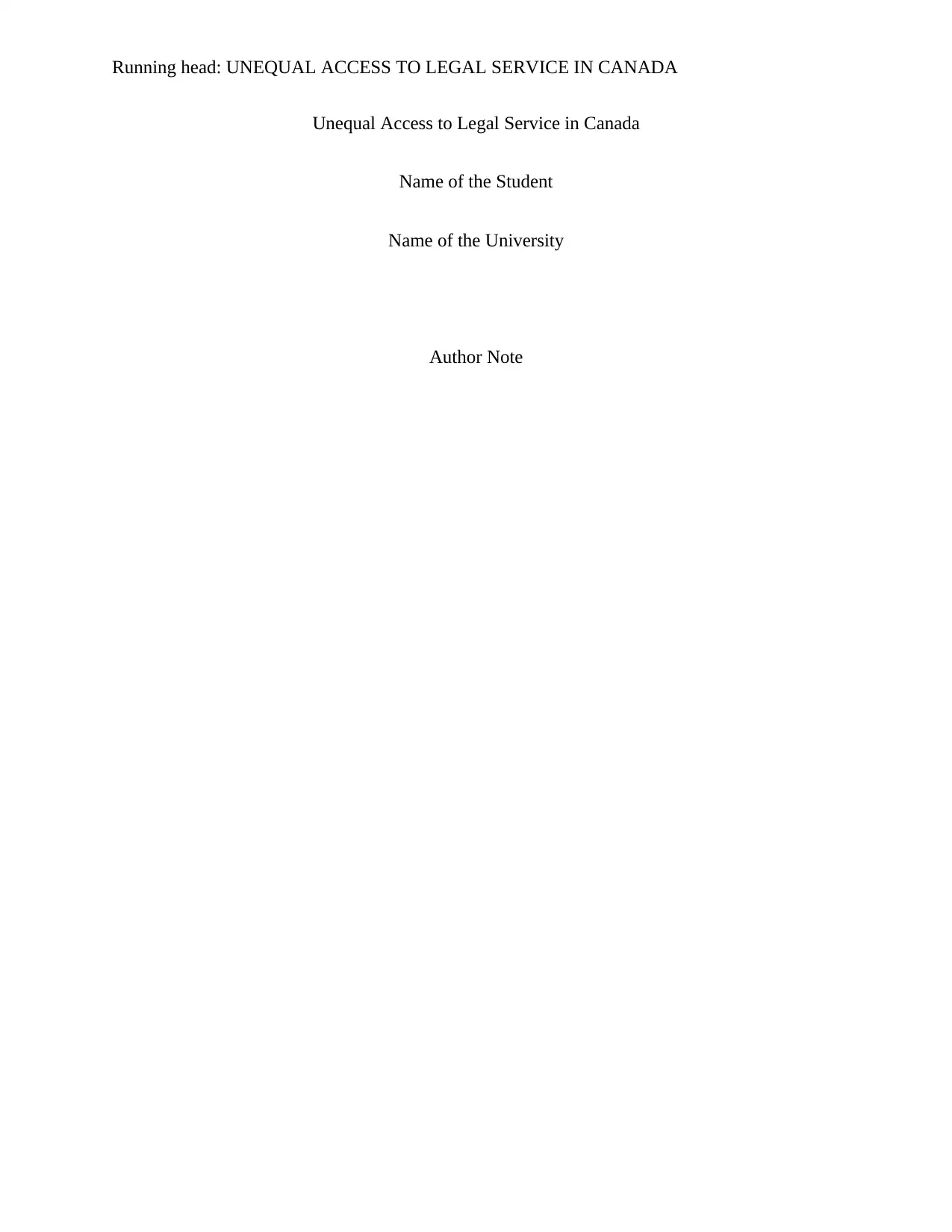
Running head: UNEQUAL ACCESS TO LEGAL SERVICE IN CANADA
Unequal Access to Legal Service in Canada
Name of the Student
Name of the University
Author Note
Unequal Access to Legal Service in Canada
Name of the Student
Name of the University
Author Note
Secure Best Marks with AI Grader
Need help grading? Try our AI Grader for instant feedback on your assignments.
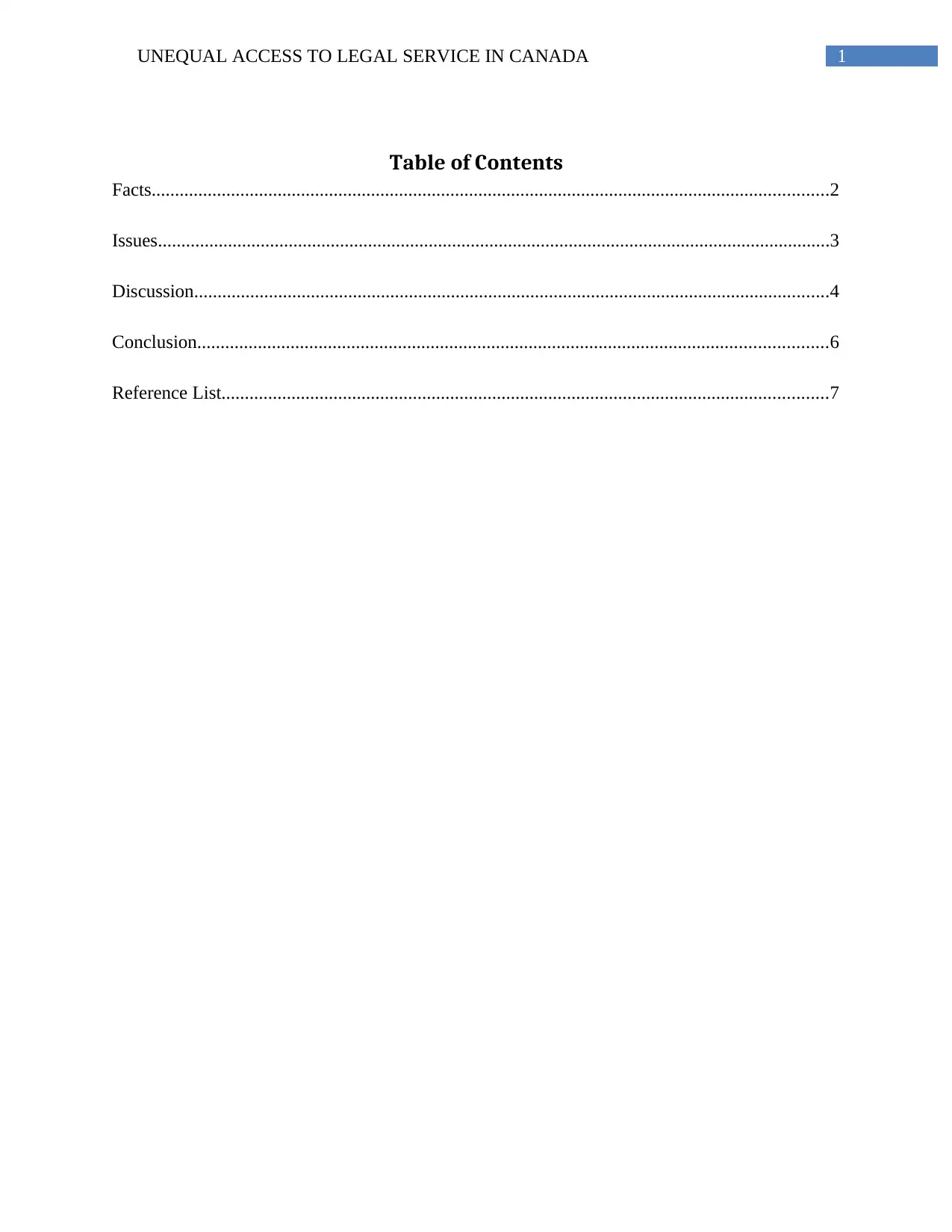
1UNEQUAL ACCESS TO LEGAL SERVICE IN CANADA
Table of Contents
Facts.................................................................................................................................................2
Issues................................................................................................................................................3
Discussion........................................................................................................................................4
Conclusion.......................................................................................................................................6
Reference List..................................................................................................................................7
Table of Contents
Facts.................................................................................................................................................2
Issues................................................................................................................................................3
Discussion........................................................................................................................................4
Conclusion.......................................................................................................................................6
Reference List..................................................................................................................................7
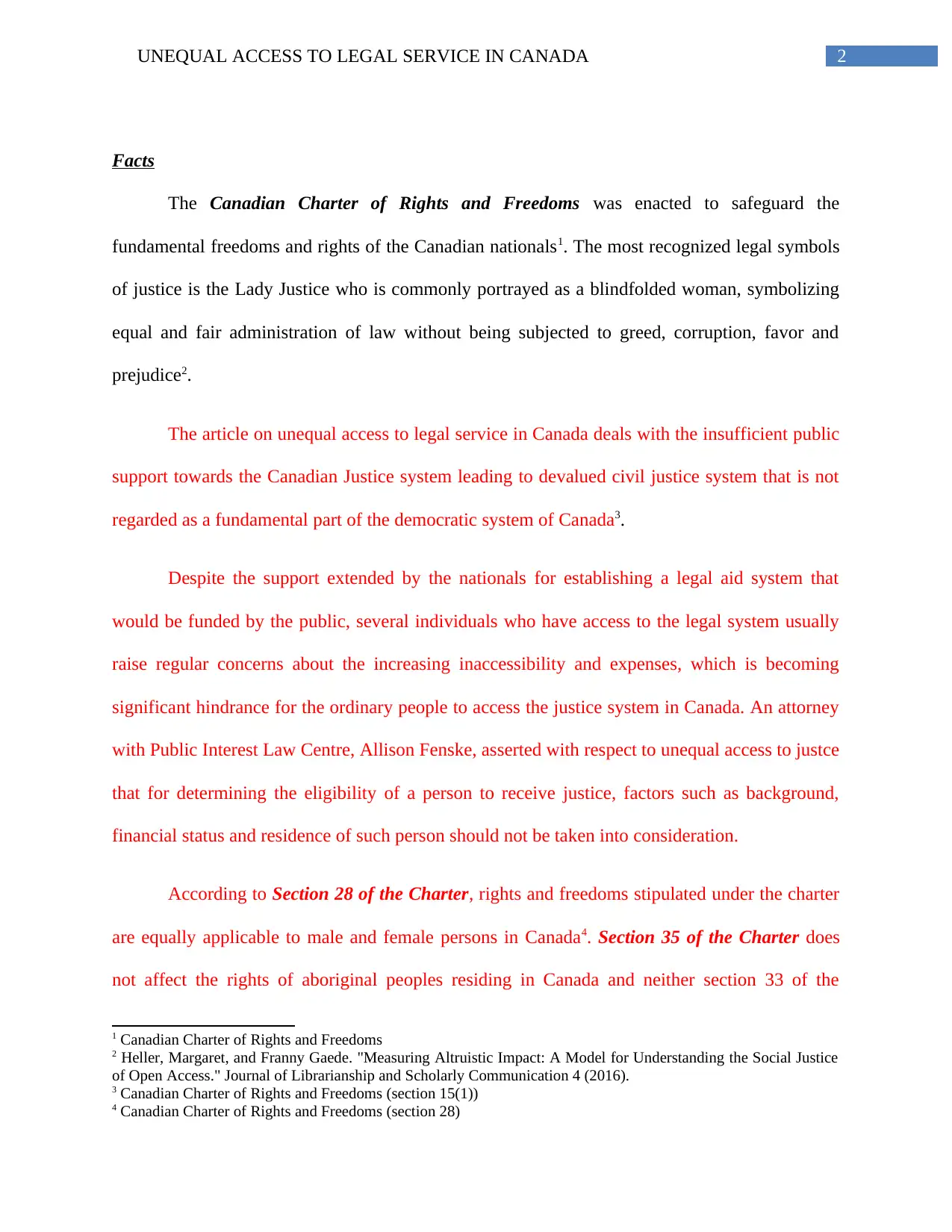
2UNEQUAL ACCESS TO LEGAL SERVICE IN CANADA
Facts
The Canadian Charter of Rights and Freedoms was enacted to safeguard the
fundamental freedoms and rights of the Canadian nationals1. The most recognized legal symbols
of justice is the Lady Justice who is commonly portrayed as a blindfolded woman, symbolizing
equal and fair administration of law without being subjected to greed, corruption, favor and
prejudice2.
The article on unequal access to legal service in Canada deals with the insufficient public
support towards the Canadian Justice system leading to devalued civil justice system that is not
regarded as a fundamental part of the democratic system of Canada3.
Despite the support extended by the nationals for establishing a legal aid system that
would be funded by the public, several individuals who have access to the legal system usually
raise regular concerns about the increasing inaccessibility and expenses, which is becoming
significant hindrance for the ordinary people to access the justice system in Canada. An attorney
with Public Interest Law Centre, Allison Fenske, asserted with respect to unequal access to justce
that for determining the eligibility of a person to receive justice, factors such as background,
financial status and residence of such person should not be taken into consideration.
According to Section 28 of the Charter, rights and freedoms stipulated under the charter
are equally applicable to male and female persons in Canada4. Section 35 of the Charter does
not affect the rights of aboriginal peoples residing in Canada and neither section 33 of the
1 Canadian Charter of Rights and Freedoms
2 Heller, Margaret, and Franny Gaede. "Measuring Altruistic Impact: A Model for Understanding the Social Justice
of Open Access." Journal of Librarianship and Scholarly Communication 4 (2016).
3 Canadian Charter of Rights and Freedoms (section 15(1))
4 Canadian Charter of Rights and Freedoms (section 28)
Facts
The Canadian Charter of Rights and Freedoms was enacted to safeguard the
fundamental freedoms and rights of the Canadian nationals1. The most recognized legal symbols
of justice is the Lady Justice who is commonly portrayed as a blindfolded woman, symbolizing
equal and fair administration of law without being subjected to greed, corruption, favor and
prejudice2.
The article on unequal access to legal service in Canada deals with the insufficient public
support towards the Canadian Justice system leading to devalued civil justice system that is not
regarded as a fundamental part of the democratic system of Canada3.
Despite the support extended by the nationals for establishing a legal aid system that
would be funded by the public, several individuals who have access to the legal system usually
raise regular concerns about the increasing inaccessibility and expenses, which is becoming
significant hindrance for the ordinary people to access the justice system in Canada. An attorney
with Public Interest Law Centre, Allison Fenske, asserted with respect to unequal access to justce
that for determining the eligibility of a person to receive justice, factors such as background,
financial status and residence of such person should not be taken into consideration.
According to Section 28 of the Charter, rights and freedoms stipulated under the charter
are equally applicable to male and female persons in Canada4. Section 35 of the Charter does
not affect the rights of aboriginal peoples residing in Canada and neither section 33 of the
1 Canadian Charter of Rights and Freedoms
2 Heller, Margaret, and Franny Gaede. "Measuring Altruistic Impact: A Model for Understanding the Social Justice
of Open Access." Journal of Librarianship and Scholarly Communication 4 (2016).
3 Canadian Charter of Rights and Freedoms (section 15(1))
4 Canadian Charter of Rights and Freedoms (section 28)
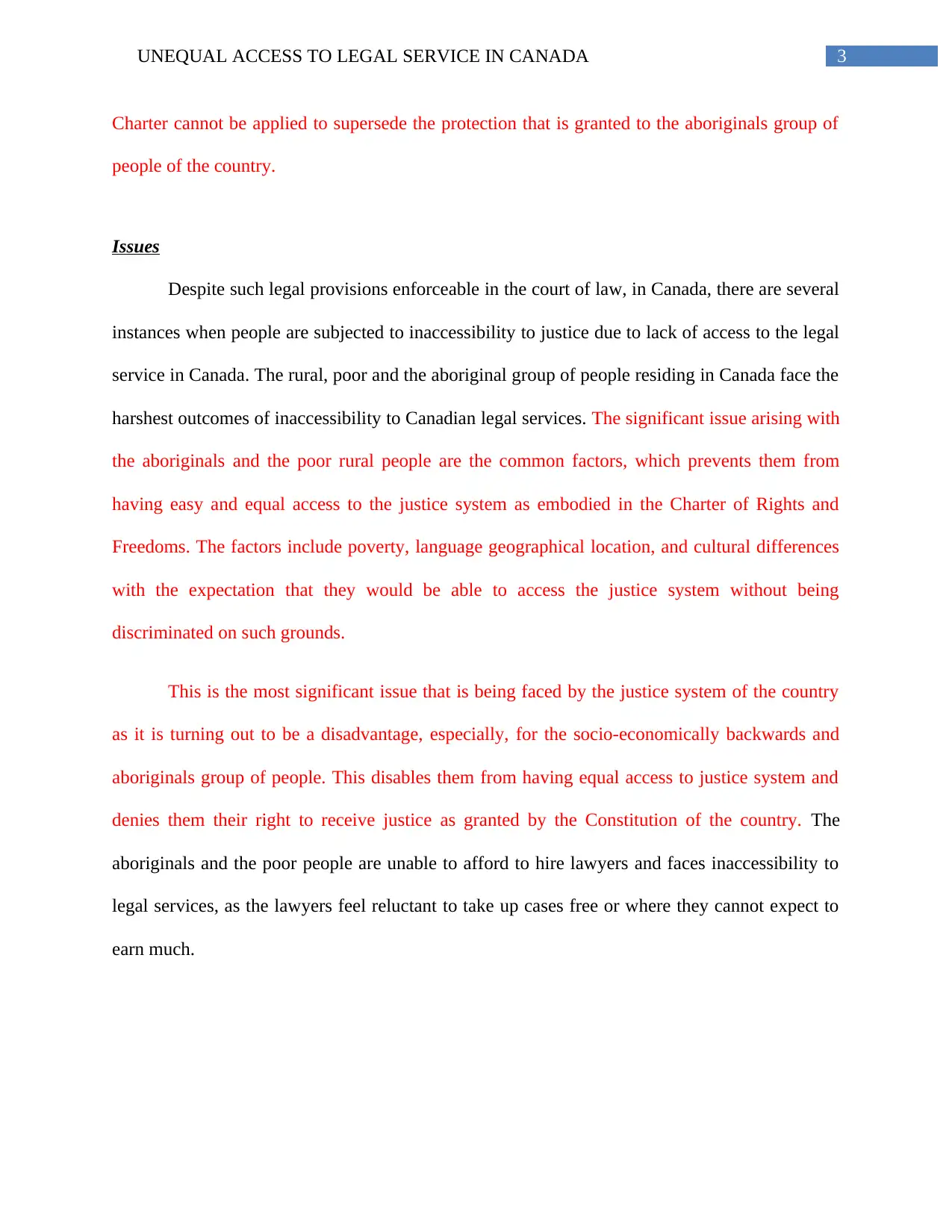
3UNEQUAL ACCESS TO LEGAL SERVICE IN CANADA
Charter cannot be applied to supersede the protection that is granted to the aboriginals group of
people of the country.
Issues
Despite such legal provisions enforceable in the court of law, in Canada, there are several
instances when people are subjected to inaccessibility to justice due to lack of access to the legal
service in Canada. The rural, poor and the aboriginal group of people residing in Canada face the
harshest outcomes of inaccessibility to Canadian legal services. The significant issue arising with
the aboriginals and the poor rural people are the common factors, which prevents them from
having easy and equal access to the justice system as embodied in the Charter of Rights and
Freedoms. The factors include poverty, language geographical location, and cultural differences
with the expectation that they would be able to access the justice system without being
discriminated on such grounds.
This is the most significant issue that is being faced by the justice system of the country
as it is turning out to be a disadvantage, especially, for the socio-economically backwards and
aboriginals group of people. This disables them from having equal access to justice system and
denies them their right to receive justice as granted by the Constitution of the country. The
aboriginals and the poor people are unable to afford to hire lawyers and faces inaccessibility to
legal services, as the lawyers feel reluctant to take up cases free or where they cannot expect to
earn much.
Charter cannot be applied to supersede the protection that is granted to the aboriginals group of
people of the country.
Issues
Despite such legal provisions enforceable in the court of law, in Canada, there are several
instances when people are subjected to inaccessibility to justice due to lack of access to the legal
service in Canada. The rural, poor and the aboriginal group of people residing in Canada face the
harshest outcomes of inaccessibility to Canadian legal services. The significant issue arising with
the aboriginals and the poor rural people are the common factors, which prevents them from
having easy and equal access to the justice system as embodied in the Charter of Rights and
Freedoms. The factors include poverty, language geographical location, and cultural differences
with the expectation that they would be able to access the justice system without being
discriminated on such grounds.
This is the most significant issue that is being faced by the justice system of the country
as it is turning out to be a disadvantage, especially, for the socio-economically backwards and
aboriginals group of people. This disables them from having equal access to justice system and
denies them their right to receive justice as granted by the Constitution of the country. The
aboriginals and the poor people are unable to afford to hire lawyers and faces inaccessibility to
legal services, as the lawyers feel reluctant to take up cases free or where they cannot expect to
earn much.
Secure Best Marks with AI Grader
Need help grading? Try our AI Grader for instant feedback on your assignments.
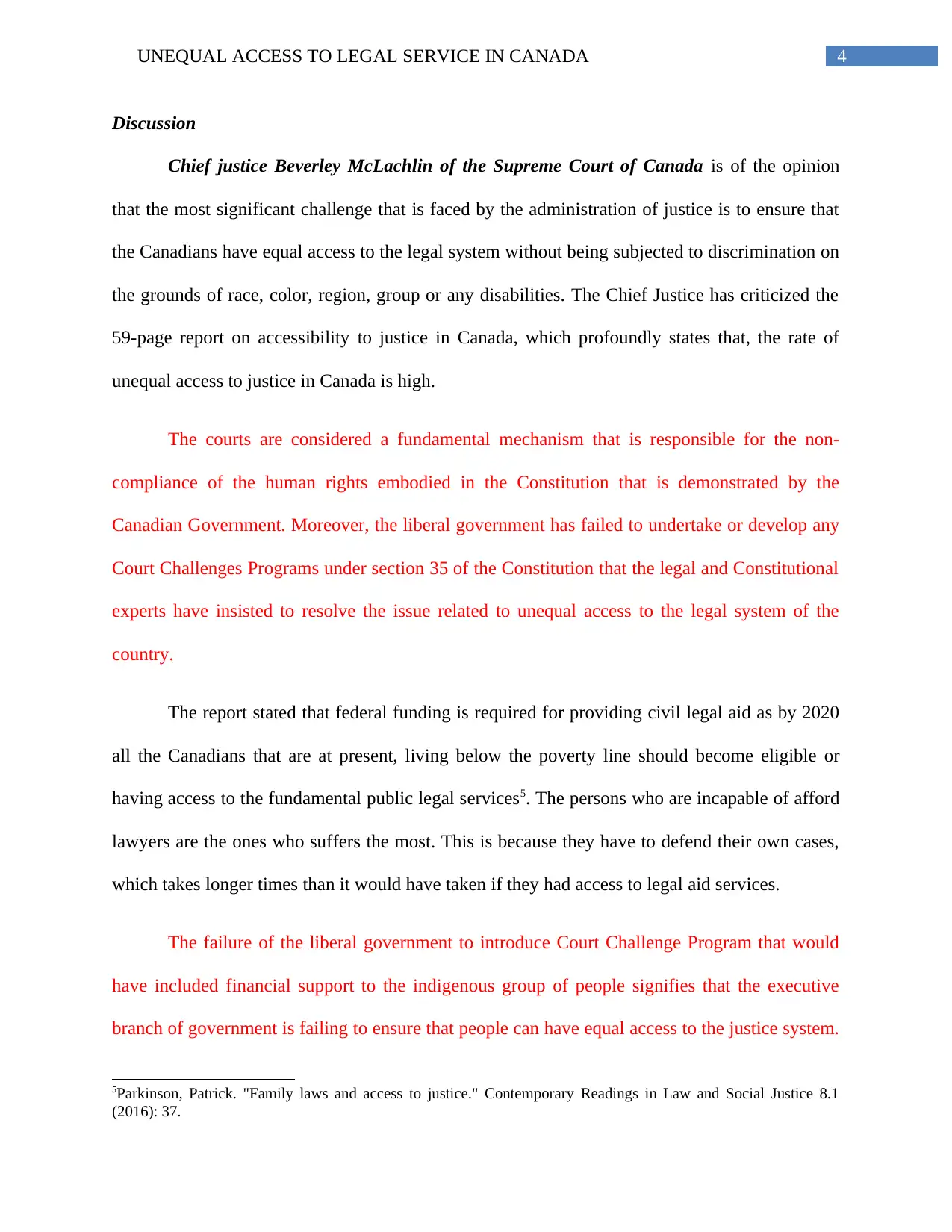
4UNEQUAL ACCESS TO LEGAL SERVICE IN CANADA
Discussion
Chief justice Beverley McLachlin of the Supreme Court of Canada is of the opinion
that the most significant challenge that is faced by the administration of justice is to ensure that
the Canadians have equal access to the legal system without being subjected to discrimination on
the grounds of race, color, region, group or any disabilities. The Chief Justice has criticized the
59-page report on accessibility to justice in Canada, which profoundly states that, the rate of
unequal access to justice in Canada is high.
The courts are considered a fundamental mechanism that is responsible for the non-
compliance of the human rights embodied in the Constitution that is demonstrated by the
Canadian Government. Moreover, the liberal government has failed to undertake or develop any
Court Challenges Programs under section 35 of the Constitution that the legal and Constitutional
experts have insisted to resolve the issue related to unequal access to the legal system of the
country.
The report stated that federal funding is required for providing civil legal aid as by 2020
all the Canadians that are at present, living below the poverty line should become eligible or
having access to the fundamental public legal services5. The persons who are incapable of afford
lawyers are the ones who suffers the most. This is because they have to defend their own cases,
which takes longer times than it would have taken if they had access to legal aid services.
The failure of the liberal government to introduce Court Challenge Program that would
have included financial support to the indigenous group of people signifies that the executive
branch of government is failing to ensure that people can have equal access to the justice system.
5Parkinson, Patrick. "Family laws and access to justice." Contemporary Readings in Law and Social Justice 8.1
(2016): 37.
Discussion
Chief justice Beverley McLachlin of the Supreme Court of Canada is of the opinion
that the most significant challenge that is faced by the administration of justice is to ensure that
the Canadians have equal access to the legal system without being subjected to discrimination on
the grounds of race, color, region, group or any disabilities. The Chief Justice has criticized the
59-page report on accessibility to justice in Canada, which profoundly states that, the rate of
unequal access to justice in Canada is high.
The courts are considered a fundamental mechanism that is responsible for the non-
compliance of the human rights embodied in the Constitution that is demonstrated by the
Canadian Government. Moreover, the liberal government has failed to undertake or develop any
Court Challenges Programs under section 35 of the Constitution that the legal and Constitutional
experts have insisted to resolve the issue related to unequal access to the legal system of the
country.
The report stated that federal funding is required for providing civil legal aid as by 2020
all the Canadians that are at present, living below the poverty line should become eligible or
having access to the fundamental public legal services5. The persons who are incapable of afford
lawyers are the ones who suffers the most. This is because they have to defend their own cases,
which takes longer times than it would have taken if they had access to legal aid services.
The failure of the liberal government to introduce Court Challenge Program that would
have included financial support to the indigenous group of people signifies that the executive
branch of government is failing to ensure that people can have equal access to the justice system.
5Parkinson, Patrick. "Family laws and access to justice." Contemporary Readings in Law and Social Justice 8.1
(2016): 37.
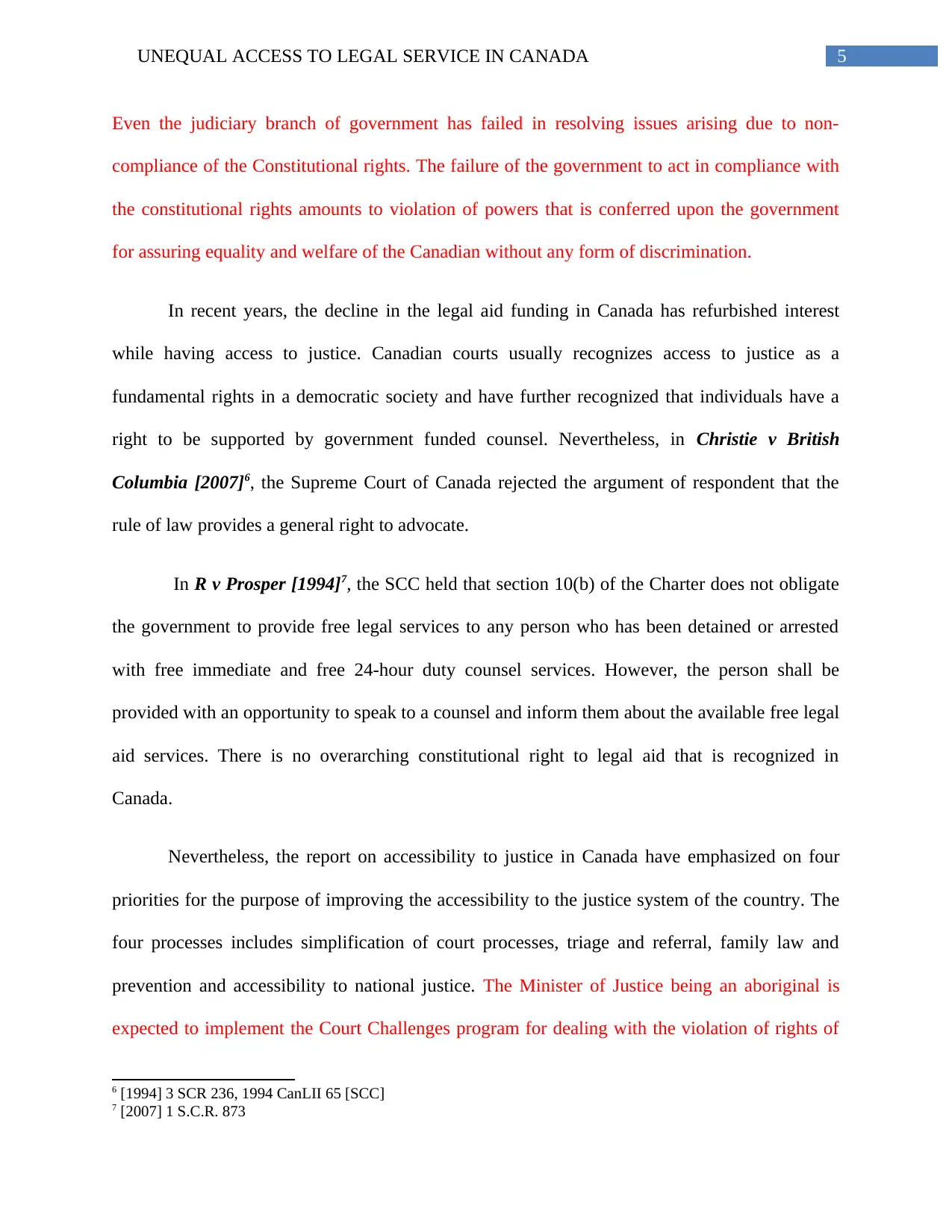
5UNEQUAL ACCESS TO LEGAL SERVICE IN CANADA
Even the judiciary branch of government has failed in resolving issues arising due to non-
compliance of the Constitutional rights. The failure of the government to act in compliance with
the constitutional rights amounts to violation of powers that is conferred upon the government
for assuring equality and welfare of the Canadian without any form of discrimination.
In recent years, the decline in the legal aid funding in Canada has refurbished interest
while having access to justice. Canadian courts usually recognizes access to justice as a
fundamental rights in a democratic society and have further recognized that individuals have a
right to be supported by government funded counsel. Nevertheless, in Christie v British
Columbia [2007]6, the Supreme Court of Canada rejected the argument of respondent that the
rule of law provides a general right to advocate.
In R v Prosper [1994]7, the SCC held that section 10(b) of the Charter does not obligate
the government to provide free legal services to any person who has been detained or arrested
with free immediate and free 24-hour duty counsel services. However, the person shall be
provided with an opportunity to speak to a counsel and inform them about the available free legal
aid services. There is no overarching constitutional right to legal aid that is recognized in
Canada.
Nevertheless, the report on accessibility to justice in Canada have emphasized on four
priorities for the purpose of improving the accessibility to the justice system of the country. The
four processes includes simplification of court processes, triage and referral, family law and
prevention and accessibility to national justice. The Minister of Justice being an aboriginal is
expected to implement the Court Challenges program for dealing with the violation of rights of
6 [1994] 3 SCR 236, 1994 CanLII 65 [SCC]
7 [2007] 1 S.C.R. 873
Even the judiciary branch of government has failed in resolving issues arising due to non-
compliance of the Constitutional rights. The failure of the government to act in compliance with
the constitutional rights amounts to violation of powers that is conferred upon the government
for assuring equality and welfare of the Canadian without any form of discrimination.
In recent years, the decline in the legal aid funding in Canada has refurbished interest
while having access to justice. Canadian courts usually recognizes access to justice as a
fundamental rights in a democratic society and have further recognized that individuals have a
right to be supported by government funded counsel. Nevertheless, in Christie v British
Columbia [2007]6, the Supreme Court of Canada rejected the argument of respondent that the
rule of law provides a general right to advocate.
In R v Prosper [1994]7, the SCC held that section 10(b) of the Charter does not obligate
the government to provide free legal services to any person who has been detained or arrested
with free immediate and free 24-hour duty counsel services. However, the person shall be
provided with an opportunity to speak to a counsel and inform them about the available free legal
aid services. There is no overarching constitutional right to legal aid that is recognized in
Canada.
Nevertheless, the report on accessibility to justice in Canada have emphasized on four
priorities for the purpose of improving the accessibility to the justice system of the country. The
four processes includes simplification of court processes, triage and referral, family law and
prevention and accessibility to national justice. The Minister of Justice being an aboriginal is
expected to implement the Court Challenges program for dealing with the violation of rights of
6 [1994] 3 SCR 236, 1994 CanLII 65 [SCC]
7 [2007] 1 S.C.R. 873
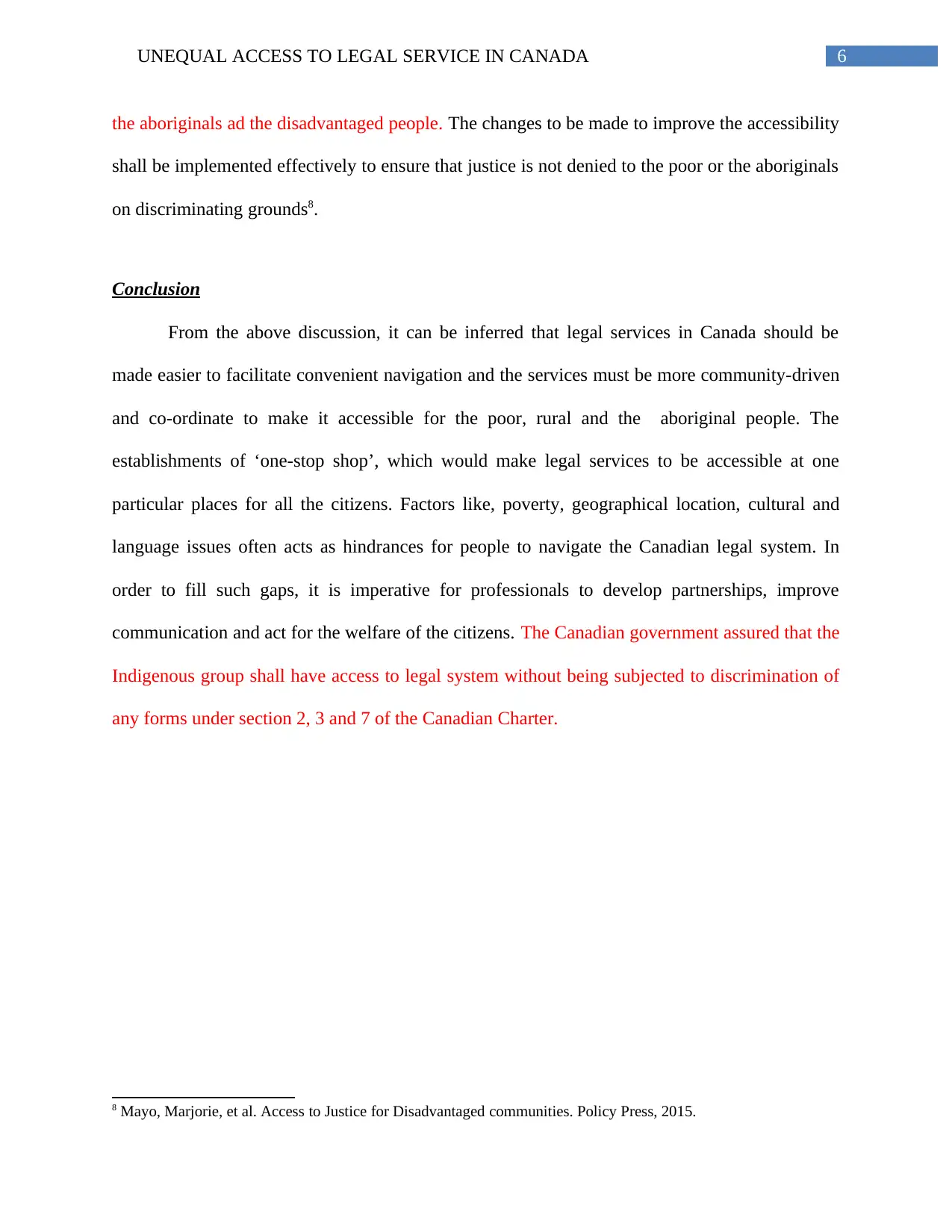
6UNEQUAL ACCESS TO LEGAL SERVICE IN CANADA
the aboriginals ad the disadvantaged people. The changes to be made to improve the accessibility
shall be implemented effectively to ensure that justice is not denied to the poor or the aboriginals
on discriminating grounds8.
Conclusion
From the above discussion, it can be inferred that legal services in Canada should be
made easier to facilitate convenient navigation and the services must be more community-driven
and co-ordinate to make it accessible for the poor, rural and the aboriginal people. The
establishments of ‘one-stop shop’, which would make legal services to be accessible at one
particular places for all the citizens. Factors like, poverty, geographical location, cultural and
language issues often acts as hindrances for people to navigate the Canadian legal system. In
order to fill such gaps, it is imperative for professionals to develop partnerships, improve
communication and act for the welfare of the citizens. The Canadian government assured that the
Indigenous group shall have access to legal system without being subjected to discrimination of
any forms under section 2, 3 and 7 of the Canadian Charter.
8 Mayo, Marjorie, et al. Access to Justice for Disadvantaged communities. Policy Press, 2015.
the aboriginals ad the disadvantaged people. The changes to be made to improve the accessibility
shall be implemented effectively to ensure that justice is not denied to the poor or the aboriginals
on discriminating grounds8.
Conclusion
From the above discussion, it can be inferred that legal services in Canada should be
made easier to facilitate convenient navigation and the services must be more community-driven
and co-ordinate to make it accessible for the poor, rural and the aboriginal people. The
establishments of ‘one-stop shop’, which would make legal services to be accessible at one
particular places for all the citizens. Factors like, poverty, geographical location, cultural and
language issues often acts as hindrances for people to navigate the Canadian legal system. In
order to fill such gaps, it is imperative for professionals to develop partnerships, improve
communication and act for the welfare of the citizens. The Canadian government assured that the
Indigenous group shall have access to legal system without being subjected to discrimination of
any forms under section 2, 3 and 7 of the Canadian Charter.
8 Mayo, Marjorie, et al. Access to Justice for Disadvantaged communities. Policy Press, 2015.
Paraphrase This Document
Need a fresh take? Get an instant paraphrase of this document with our AI Paraphraser
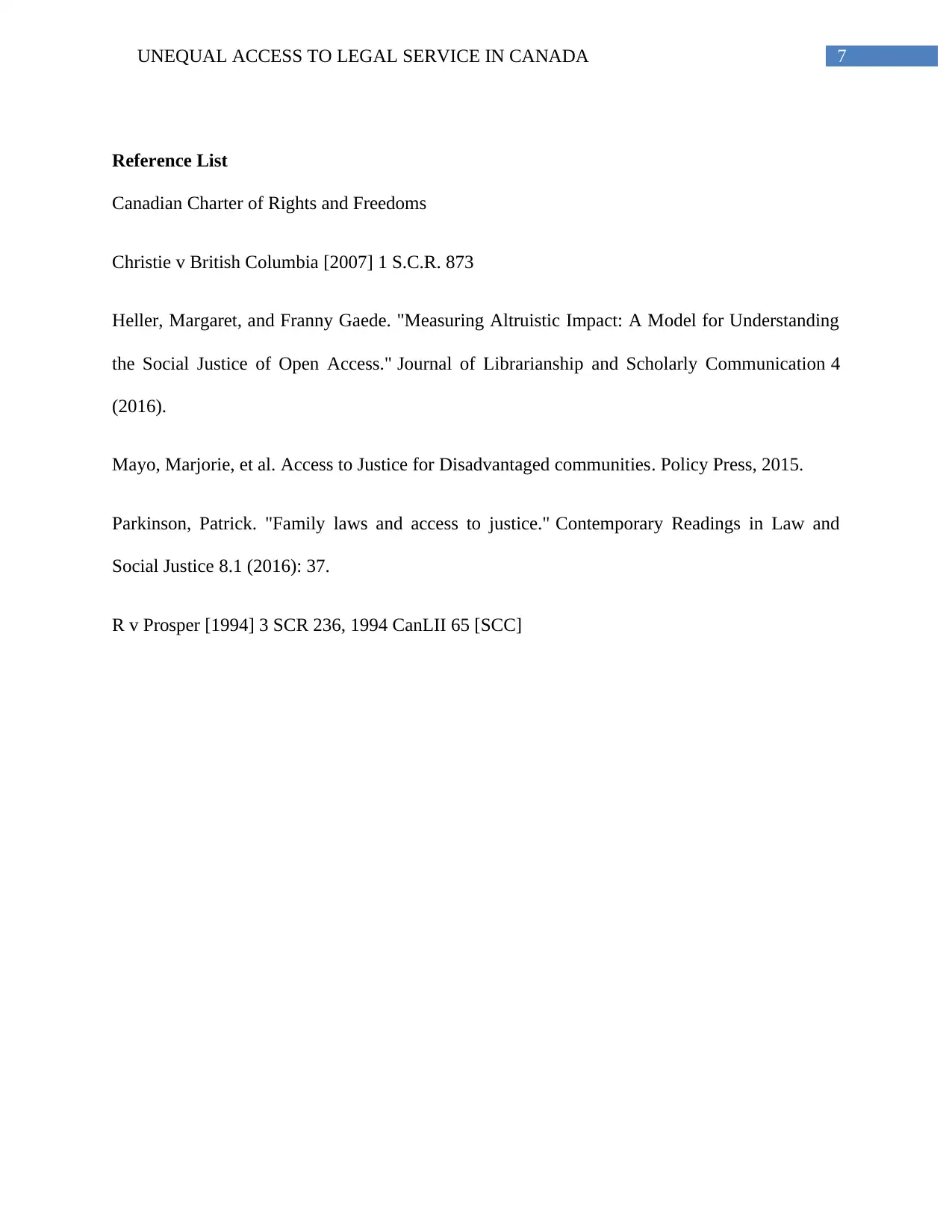
7UNEQUAL ACCESS TO LEGAL SERVICE IN CANADA
Reference List
Canadian Charter of Rights and Freedoms
Christie v British Columbia [2007] 1 S.C.R. 873
Heller, Margaret, and Franny Gaede. "Measuring Altruistic Impact: A Model for Understanding
the Social Justice of Open Access." Journal of Librarianship and Scholarly Communication 4
(2016).
Mayo, Marjorie, et al. Access to Justice for Disadvantaged communities. Policy Press, 2015.
Parkinson, Patrick. "Family laws and access to justice." Contemporary Readings in Law and
Social Justice 8.1 (2016): 37.
R v Prosper [1994] 3 SCR 236, 1994 CanLII 65 [SCC]
Reference List
Canadian Charter of Rights and Freedoms
Christie v British Columbia [2007] 1 S.C.R. 873
Heller, Margaret, and Franny Gaede. "Measuring Altruistic Impact: A Model for Understanding
the Social Justice of Open Access." Journal of Librarianship and Scholarly Communication 4
(2016).
Mayo, Marjorie, et al. Access to Justice for Disadvantaged communities. Policy Press, 2015.
Parkinson, Patrick. "Family laws and access to justice." Contemporary Readings in Law and
Social Justice 8.1 (2016): 37.
R v Prosper [1994] 3 SCR 236, 1994 CanLII 65 [SCC]
1 out of 8
Related Documents
Your All-in-One AI-Powered Toolkit for Academic Success.
+13062052269
info@desklib.com
Available 24*7 on WhatsApp / Email
![[object Object]](/_next/static/media/star-bottom.7253800d.svg)
Unlock your academic potential
© 2024 | Zucol Services PVT LTD | All rights reserved.




